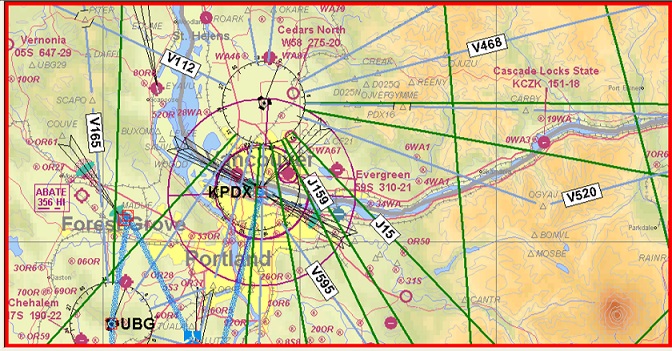Seattle HN Meetup: 5 Things Pilots Can Teach Entrepreneurs

This post is based on a talk by Ron Wiener, the CEO of iMovr (maker of treadmill desks) at a past Seattle Hacker News meetup. Ron is a serial entrepreneur who has founded six companies, five of which were venture backed. He was featured in the reality series Startup Junkies, while founding Earth Class Mail—a company that receives physical mail on behalf its customers and then emails them digital copies of the most important pieces. Ron is a licensed pilot.
1. “Do what you love, the rest will follow” is H-O-R-R-I-B-L-E Advice.
As a flying enthusiast, Ron did his first venture in the aviation industry. The business was unsuccessful and he realized that the industry tends to attract a lot of enthusiasts like himself who just want to be around planes but are clueless about how they will make money. Instead, figure out what the markets and investors love and then do that.
Ron’s current venture, while started to tickle his own itch--addressing his health issues after years of crazy working hours and poor lifestyle—also aligns well with broader market trends.
2. Determine if Your Pursuit is a Hobby, Commercial Aviation or Space Exploration. Behave Accordingly.
For entrepreneurs, a hobbyist is a boot-strapper while commercial aviation is a more serious business venture with investors and employees. Space exploration, is pursuit of a ‘unicorn’ like Facebook, Google or Amazon. It is defined by massive risk, massive expense and massive disruption.
Only bad things happen when entrepreneurs are unsure about which category their business is in! For example, boot-strappers should minimize burn-rate as much as possible and make every dollar count.
On the other hand, if you are in space exploration you need to ‘put money to work’ and do a massive ‘land grab’ as fast as possible (acquire market-share). Having a boot-strapper’s mentality in the space exploration business could be the very thing that dooms your company! Joel Spolsky also made this point in Strategy Letter I.
3. Continuously Re-orient. Pilots Always Ask “Where Am I? Where Do I Want to Go? How Am I Going to Get There?”

A pilot’s tools are navigational aids such as GPS, aeronautical charts and air traffic controllers. An entrepreneur’s are financial statements, key business metrics and market feedback.
4. Simulate Before You Aviate
There are only two kinds of pilots. a) Those who have experienced a crash and b) those who have yet to but will eventually. The best pilots always simulate possible scenarios:
Equivalent questions you should answer are:
Also learn from the mistakes of others, recruit mentors and read voraciously.
When Ron talked about this, I was reminded about the Kopmeyer story. Kop Kopmeyer spent years studying success and distilled his findings into the famous 1000 Principles of Success. An impatient student once asked him, “These 1000 principles are fine and good but I just want to know, which is the most important one?"
“Learn from the experts. You will never live long enough to learn it all directly from experience” Kopmeyer said:
Charlie Munger, the other half of Warren Buffett’s brain, has often doled the same advice:
“In my whole life, I have known no wise people (over a broad subject matter area) who didn't read all the time -- none, zero. You'd be amazed at how much Warren reads--and at how much I read. My children laugh at me. They think I'm a book with a couple of legs sticking out.”
4.5 Do You Have Enough Runway?
Pilots are ever mindful about runway and know that a long enough runway is always dependent on the surface type, precipitation, braking power, thrust and crosswinds.Runway behind you is never your friend.
Similarly, entrepreneurs should be keenly aware of cash reserves and burn rate. If it makes sense, trade CapEx for OpEx i.e. don’t buys a server if you can rent the cloud. But whatever you do, don’t run out of cash!
Capital & Growth co-organizes and co-sponsors Seattle Hacker News meetups. The next meetup is in late August and the speaker will be Peter McLoughlin the CEO of the Seattle Seahawks.(he is also responsible for the Portland Trailblazers and the Seattle Sounders).
He will talk about the digital challenges his organization faces, building a national brand and a high performance culture. Peter may also touch on the trend among football players/ex-players to do the their own startups or become angel investors. We intend to experiment with an AMA (Ask Me Anything) format and live stream it. You are welcome to join us and send questions in advance.

This post is based on a talk by Ron Wiener, the CEO of iMovr (maker of treadmill desks) at a past Seattle Hacker News meetup. Ron is a serial entrepreneur who has founded six companies, five of which were venture backed. He was featured in the reality series Startup Junkies, while founding Earth Class Mail—a company that receives physical mail on behalf its customers and then emails them digital copies of the most important pieces. Ron is a licensed pilot.
1. “Do what you love, the rest will follow” is H-O-R-R-I-B-L-E Advice.
As a flying enthusiast, Ron did his first venture in the aviation industry. The business was unsuccessful and he realized that the industry tends to attract a lot of enthusiasts like himself who just want to be around planes but are clueless about how they will make money. Instead, figure out what the markets and investors love and then do that.
Ron’s current venture, while started to tickle his own itch--addressing his health issues after years of crazy working hours and poor lifestyle—also aligns well with broader market trends.
2. Determine if Your Pursuit is a Hobby, Commercial Aviation or Space Exploration. Behave Accordingly.
For entrepreneurs, a hobbyist is a boot-strapper while commercial aviation is a more serious business venture with investors and employees. Space exploration, is pursuit of a ‘unicorn’ like Facebook, Google or Amazon. It is defined by massive risk, massive expense and massive disruption.
Only bad things happen when entrepreneurs are unsure about which category their business is in! For example, boot-strappers should minimize burn-rate as much as possible and make every dollar count.
On the other hand, if you are in space exploration you need to ‘put money to work’ and do a massive ‘land grab’ as fast as possible (acquire market-share). Having a boot-strapper’s mentality in the space exploration business could be the very thing that dooms your company! Joel Spolsky also made this point in Strategy Letter I.
3. Continuously Re-orient. Pilots Always Ask “Where Am I? Where Do I Want to Go? How Am I Going to Get There?”

A pilot’s tools are navigational aids such as GPS, aeronautical charts and air traffic controllers. An entrepreneur’s are financial statements, key business metrics and market feedback.
4. Simulate Before You Aviate
There are only two kinds of pilots. a) Those who have experienced a crash and b) those who have yet to but will eventually. The best pilots always simulate possible scenarios:
- What if there are air traffic delays?
- What if the engine quits?
- What if the landing gear jams?
- What if a thunderstorm develops in your path?
Equivalent questions you should answer are:
- What if the product is late?
- What if revenues miss?
- What if expenses exceed budget?
- What about other human factors like life’s little distractions, external events, elections, macro-economics or 9/11?
- Always model the Best Case, Worst Case and Most Probable scenarios
- State the Best Case to motivate investors, employees, vendors – never count on it or say “this is the target we expect to achieve”.
- Use the Worst Case to make sure you’ve raised enough cash and have developed sufficient contingencies.
- Try hard to achieve the Most Probable, and beat it as often as possible.
Also learn from the mistakes of others, recruit mentors and read voraciously.
When Ron talked about this, I was reminded about the Kopmeyer story. Kop Kopmeyer spent years studying success and distilled his findings into the famous 1000 Principles of Success. An impatient student once asked him, “These 1000 principles are fine and good but I just want to know, which is the most important one?"
“Learn from the experts. You will never live long enough to learn it all directly from experience” Kopmeyer said:
Charlie Munger, the other half of Warren Buffett’s brain, has often doled the same advice:
“In my whole life, I have known no wise people (over a broad subject matter area) who didn't read all the time -- none, zero. You'd be amazed at how much Warren reads--and at how much I read. My children laugh at me. They think I'm a book with a couple of legs sticking out.”
4.5 Do You Have Enough Runway?
Pilots are ever mindful about runway and know that a long enough runway is always dependent on the surface type, precipitation, braking power, thrust and crosswinds.Runway behind you is never your friend.
Similarly, entrepreneurs should be keenly aware of cash reserves and burn rate. If it makes sense, trade CapEx for OpEx i.e. don’t buys a server if you can rent the cloud. But whatever you do, don’t run out of cash!
Capital & Growth co-organizes and co-sponsors Seattle Hacker News meetups. The next meetup is in late August and the speaker will be Peter McLoughlin the CEO of the Seattle Seahawks.(he is also responsible for the Portland Trailblazers and the Seattle Sounders).
He will talk about the digital challenges his organization faces, building a national brand and a high performance culture. Peter may also touch on the trend among football players/ex-players to do the their own startups or become angel investors. We intend to experiment with an AMA (Ask Me Anything) format and live stream it. You are welcome to join us and send questions in advance.


